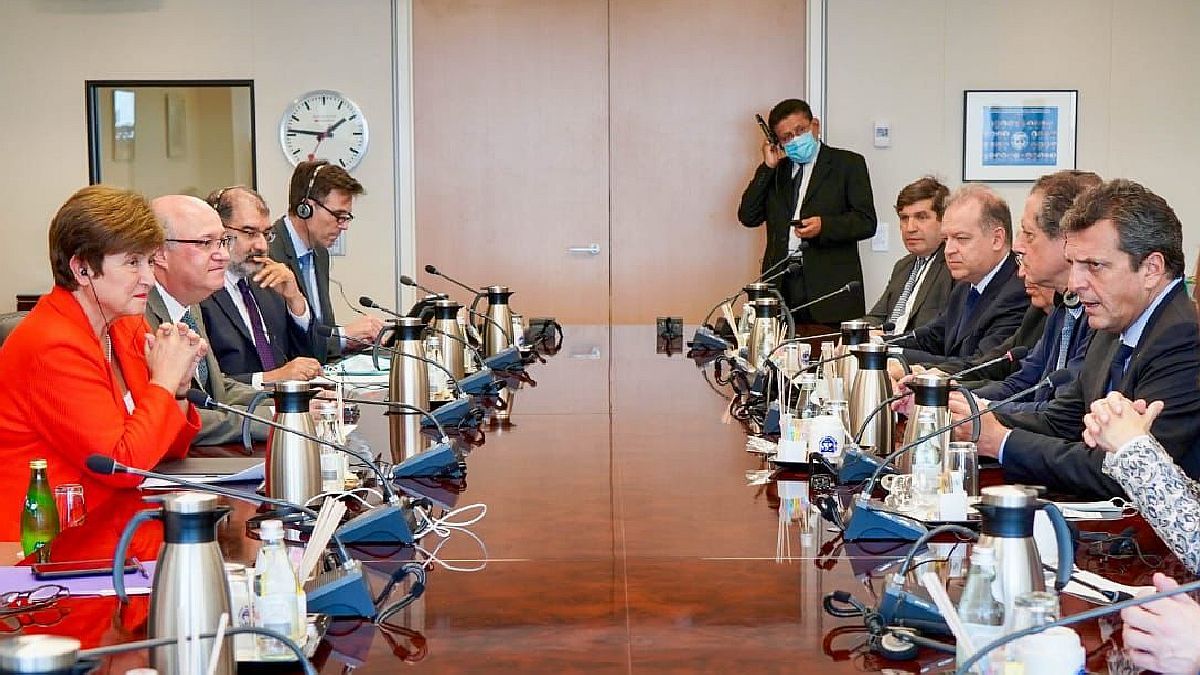With the aim of achieving the goal of a fiscal deficit of 1.9% for the current year, agreed in the agreement with the International Monetary Fund (IMF), the Government launched adjustment measures that led to cuts in the public spending in seven of the nine months of the year, as indicated in a private report. After the November 19 ballotthe organization led by Kristalina Georgieva You will know who you will have to negotiate with during the next four years.
Even during the months of August and September, which were marked by devaluation and acceleration of inflationary dynamics, it was observed a real drop in spending close to 6% on average. Until September, the accumulated fiscal deficit reached 1.5% of the Gross Domestic Product (GDP), and potentially more challenging months still have to be faced. Amid this reduction in spending, a 5.5% decrease in real terms in social benefits was recorded during the third quarter.
The report by the consulting firm Sarandí maintains that “The fiscal situation in Argentina is extremely delicate, with thirteen consecutive years of public accounts in deficit”. Hence, This challenge is compounded by the need to meet the requirements of fiscal convergence of the program agreed with the IMF, which is in conflict with the scarcity of resources due to the drought. In addition, the exceptional spending “associated with the construction of the gas pipeline has put pressure on capital expenditures, which tend to be seasonal in odd-numbered years.” This situation is complicated by the prolonged electoral process underway, “which influences the allocation of funds, especially in areas of high political relevance.”
Adjustment: the distance traveled until today
Thus, the document reveals that consolidated public spending has experienced a decrease in seven of the nine months of 2023 and that, this fiscal moderation process It began with the change of leadership in the Ministry of Economy, when Minister Guzmán adjusted fiscal policy. A first milestone in this direction was established by Batakis, with a restrictive program that aligned spending with real financial projections.
In addition, it announced the freezing of staff and the implementation of a single account system to prioritize spending. However, this austerity approach was short-lived, since Massa maintained his policies without the political objections that Guzmán faced, and applied budget cuts in most public sector functions. Maximum austerity was reached at the end of 2023, with spending reduced by 20% compared to inflation.
The block of “social benefits” represents the most significant part of the budget, with 54.6% of spending and most of its components adjusted for inflation. In this sector, sand a real reduction of 5.5% has been recorded in the third quarter of 2023, which constitutes an essential component to avoid a significant increase in the deficit, given its impact and its centralized management.
During the first three quarters of 2023, “There has been a decrease in spending on pensions of 7.4% and on family allowances, including the Universal Child Allowance (AUH), of 27.4%.“. This may seem paradoxical, given that most of these items are indexed, but it is due to the rapid erosion caused by hyperinflation, which exceeds the adjustment capacity of the formula. The Government has attempted to partially compensate sectors vulnerable to through income transfers, but these measures have not been sufficient in the face of the constant escalation of prices.
Spending and subsidies
Another relevant component of spending is related to “economic subsidies”, which represent the State’s efforts to reduce the cost of living for families. In recent months, according to the report, “Progress has been made in a gradual process of normalization of rates, as part of the agreement with the IMF that seeks to correct relative prices“. Spending on economic subsidies has decreased by 23% in relation to inflation during the first three quarters of the year, “mainly due to the reduction in state coverage of energy service rates, which has had an impact on the country’s GDP“.
This year, significant increases in natural gas and electricity rates have been observed in the AMBA metropolitan area,”reaching up to 300% increase”, depending on consumption. Despite these increases, there is still room for additional adjustments, says Sarandí. This raises “concerns from both a fiscal and ethical perspective, as it represents a misallocation of resources, with regressive effects on distribution and negative consequences on energy efficiency.”
Meanwhile, capital spending has remained unchanged amid fiscal adjustment efforts. This spending is allocated to transfers to the districts for infrastructure projects, housing construction and sanitation, among others. Through September, capital spending has increased by 10.9% compared to inflation, raising its average share of the budget to 8.9% by 2023, up from 7.4% in the previous period. This prioritization has led to capital spending reaching its highest proportion in six years.
Thus, much of this increase is attributed to the extraordinary investment in the Néstor Kirchner Gasduct during the first semester, which involved a cost of approximately US$2.7 billion and was financed with public funds. For the second phase of the gas pipeline, The participation of private investors, such as oil companies, who benefit from greater production transportation capacity, is expected.
Source: Ambito




